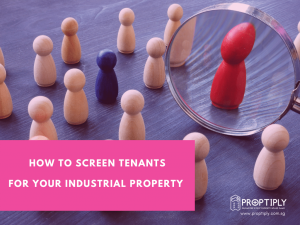
If you are a landlord of an industrial investment property, having the right tenant makes your job much easier. With a “good quality” tenant, your investment becomes worthwhile as your goal of collecting stable, passive monthly income can proceed smoothly without any hiccups. However, if you are stuck with the wrong kind of tenant, you could end up draining your resources.
In our previous article on the commercial considerations of buying industrial property, we highlighted it would be ideal if the purchase comes with an existing tenancy agreement. Not only would this help you in your bank loan application to finance your purchase, but it would also save you a lot of time and energy in finding a tenant. You also don’t have to deal with cash flow shortfalls if your unit is vacant.
So, how do you assess whether your tenant is the right fit for you? Here are some tips on how to screen existing tenants when you are evaluating an industrial property for purchase.
1. Type of industry
If your tenant is in an industry that is highly seasonal or where demand for their goods or services is susceptible to economic conditions, then their business might not be so stable. Choose a tenant which has a sound business model in an industry that is likely to withstand fluctuations in business cycles. These kinds of tenants are likely to have more stable revenue streams and are less likely to vacate your unit.
2. Number of years of establishment
A tenant that has been established for quite a number of years is likely to have deeper convictions in maintaining a business footprint in Singapore. They may already have a strong brand presence and are committed to growing their business in Singapore. These companies are thus more likely to sign longer leases. On the other hand, the outlook for young start-ups can be uncertain so it’s best to avoid these tenants unless their business model is really very strong with a high potential for success.
3. Size of the company
When it comes to choosing a tenant, a listed company, an MNC or large SME would typically trump a start-up or an outfit with smaller capital. These larger companies are more stable and are likely to have greater cash reserves. They are likely to commit to longer leases to avoid the hassle and cost of relocation.
4. Financial standing
Where records are publicly available, it makes sense for you to check the financial position of the prospective tenant and find out whether there are any financial red flags. From their financial statements, you will be able to analyse their cash holdings, liquidity, lines of credit, receivables position and leverage. A company which has a strong cash flow and revenue is likely to keep up with monthly payments.